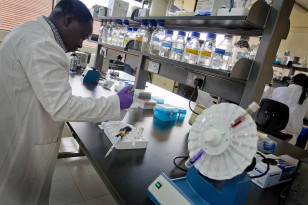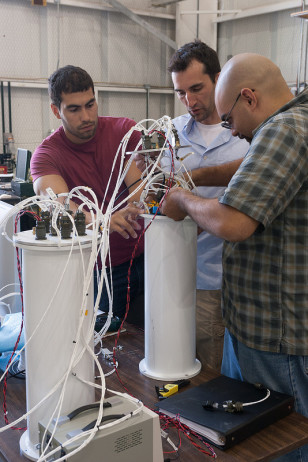
A scientist works in a laboratory at the International Livestock Research Institute in Nairobi, Kenya. (Australia Dept of Foreign Affairs & Trade/Creative Commons)
Americans like scientists. They’re really interested in learning all about the latest scientific breakthroughs too. But, unfortunately, it appears that a number of them can also use some tutoring to learn and better understand science.
This bit of insight into the American public’s perception and understanding of science was determined by a survey of more than 2,200 people and is included in the latest biennial report from the National Science Board (NSB).
“It’s important for Americans to maintain a high regard for science and scientists,” said John Besley, from Michigan State University. “It can help ensure funding and help attract future scientists.”
Besley reviewed the survey data and was the lead author of the section of the NSB’s paper that examined the public perceptions of science and technology.
Every two years, the National Science Board, the governing body of the National Science Foundation, prepares and releases its report, “Science and Engineering Indicators,” which is also presented to the President and Congress.
The 2014 edition of the report finds that more than 90 percent of Americans think scientists are “helping to solve challenging problems” and are “dedicated people who work for the good of humanity.”
But when it comes to being able to answer some fundamental science questions, Americans apparently have a bit of difficulty. Out of a total of nine questions about physical and biological sciences, they were able to correctly answer an average of 6.5 of them.
About 74 percent of those surveyed, for example, knew that the Earth revolved around the sun (thank you Mr. Copernicus). And when it came to the theory of evolution, only 48 percent knew that human beings developed from earlier species of animals.
Other highlights in the NSB survey include:
- More than 90 percent, representing a majority of Americans, said that they were “very interested” or “moderately interested” in learning about new medical discoveries.
- About 60 percent of Americans said that they had visited a zoo, aquarium, natural history museum or a science and technology museum.
- Just about 90 percent of those who were surveyed said that they think the benefits of science outweigh any potential dangers.
- Close to 33 percent of those who responded to the survey said that they think science and technology should get more funding.
And so members of the scientific community, it appears that the American public in general, needs to brush up on science, is quite supportive of you and your work, but they’re perhaps a bit unsure of just how to pay for it.






















Among scientists are some of the most fortunate people in our society. To have intense curiosity and at times its accompanying enthusiasm is to me desirable. In other words, learning can be fun. Sometimes their work benefits all of us. Please my fellow non-scientists be willing to pay more for the endeavors of the able and interested.